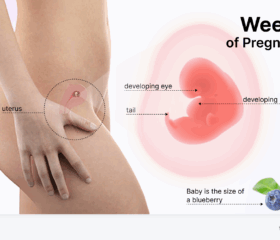Food Aversions During Pregnancy: Causes and How to Cope
If you're suddenly gagging at the sight and smell of red meat or eggs—or any food you loved before pregnancy—you're probably dealing with a food aversion.

Appetite changes are a common pregnancy symptom. While you might be more familiar with cravings during pregnancy, experiencing food aversions is also par for the course.
But why do certain foods make you want to hurl, and how can you cope when staples in your diet suddenly become your worst enemies? Read on to find out.
What are food aversions?
A food aversion is an intense feeling of disgust towards a particular food or drink, even one you liked before getting pregnant. “Aversion” means it’s more than a simple dislike; you may experience nausea just from the sight, smell, or taste of these foods.
Food aversions are essentially the opposite of cravings, where you’ll have a sudden, strong desire for a specific food. It’s possible to experience food aversions and cravings at the same time. You might even hate a particular food at one point during your pregnancy, only to crave it later on.
Common foods that pregnant women have aversions toward
While the exact foods you’re disgusted by will vary, many women have aversions toward:
- Meat (especially red meat)
- Seafood
- Eggs
- Onions
- Garlic
- Coffee
Aversions can also include fatty, spicy, or bitter foods, as well as drinks that are alcoholic (which isn’t a bad thing, as you should never drink alcohol while you’re pregnant), and even canned foods or other caffeinated beverages besides coffee.
If this isn’t your first pregnancy, you may even find that your aversions are different from those you had in a previous pregnancy.
When do food aversions start and end?
Food aversions often pop up during the first trimester, sometimes as a result of morning sickness. You may experience more nausea and aversions due to fluctuations in your hormones, particularly human chorionic gonadotropin (hCG). 1 2
Fortunately, if nausea is the main cause of your aversions, you’ll be glad to know that it usually resolves between 9 weeks and 12 weeks of pregnancy. 3
For many women, other (non-nausea-induced) food aversions get stronger during the second trimester before fading in the third trimester. However, every pregnancy is different, and you may experience aversions throughout your entire pregnancy. In rare cases, aversions can even linger after childbirth.
Not all women experience food aversions
While food aversions are often a part of pregnancy, it’s totally normal if you don’t have any. It’s also normal to have only cravings, though they’re not a given, either.
What causes food aversions during pregnancy?
The exact cause of food aversions remains a topic of ongoing research, but several factors are thought to play a role:
Hormones
As mentioned, your hormones could be partly to blame for your food aversions. Other than hCG, higher estrogen levels can affect your sense of taste (dysgeusia) and smell, making you more sensitive to certain flavors or odors. 4
Dysgeusia can also cause a sour or metallic taste in your mouth, even when you’re not eating, which may also contribute to food aversions. 5
Progesterone, one of the other classic pregnancy hormones, can also slow down your digestive system. This can make you nauseous. 6
Food safety
Some theories suggest that changes in your appetite protect you and your baby during pregnancy. The idea is that food aversions may be your body’s way of steering you away from foods that potentially contain dangerous bacteria or parasites, like eggs, meats, or fish.
Aversions might be particularly important during the early stages of your pregnancy when your baby’s organs are developing and the risk of miscarriage is higher. 7
Experiencing nausea and vomiting might also prevent potentially harmful substances that could cause your baby to have developmental abnormalities or birth defects. 3
However, note that you can have a healthy pregnancy without experiencing aversions. Focus on maintaining a balanced pregnancy diet, taking your prenatal vitamins, and attending your check-ups with your doctor.
How can you manage your food aversions?
Usually, managing your food aversions comes down to changing your eating habits. You can still eat three regular meals a day, but aim for smaller portions, and try to have two to four snacks a day.
Eat every two to three hours to keep your blood sugar level stable, reduce nausea, and curb your hunger. 8 9 10 You can also try:
- Avoiding triggers: Normally, foods with strong smells or tastes can set off your nausea, usually if they’re spicy, fried, greasy, or too hot. Pay attention to your triggers, and don’t force yourself to eat something that’s causing nausea or discomfort.
- Eat cold and bland foods: Eating cold food might help since the smell or taste might be more manageable. You can also try bland foods like crackers, toast, or plain rice that may be easier to tolerate. 11 12
- Eating acidic or citrusy foods: Try acidic or citrusy foods to get rid of the metallic taste in your mouth. Good options are lemonade or vinegar-marinated food. 5
- Maintaining oral hygiene: Brush your teeth and tongue with a pinch of salt or baking soda to remove lingering tastes or smells that make you nauseous. Regularly brushing your teeth also prevents cavities, which is especially important if you’re snacking more.
- Preparing food differently: Sometimes, changing the way you prepare food can make it more appealing. Can’t stand boiled eggs? Try scrambling or poaching them.
- Using natural remedies: Try products made with real ginger to manage nausea, like tea, ale (non-alcoholic, of course), candies, or supplements. 12 13
If you have trouble even staying in the kitchen without feeling queasy, ask your partner, a family member, or a friend to do the cooking. Alternatively, opt for pre-prepared meals or takeout, though that can get expensive.
How can you eat healthily while avoiding certain foods?
Aversions can make you miss out on essential nutrients like protein. If you can’t stomach meat, try vegetarian options, such as pregnancy-friendly cheeses, tofu, lentils, beans, seeds, or nuts. 14 15 You could even try a smoothie with protein powder.
Smoothies also work if you’re not a fan of veggies at the moment. Blend them into your favorite mixes or pick options that don’t have strong tastes or smells.
If you’re struggling to keep dairy down, explore alternatives like almond, soy, or coconut milk. If coffee is a no-go, swap it out for pregnancy-safe herbal teas or another caffeine-free alternative.
When should you talk to your doctor about your food aversions?
If your food aversions make it difficult for you to maintain a balanced diet, speak with your doctor. They can put you in touch with a registered dietitian who’ll develop a meal plan to get you back on track with meeting your nutritional needs.
You should also talk to your doctor if you have persistent nausea and vomiting (more than 3 times a day), show signs of dehydration (e.g., dark urine or lightheadedness), and lose more than 5% of your pre-pregnancy weight. 16
These signs could mean you have hyperemesis gravidarum (HG), a serious form of morning sickness. If left untreated, it can lead to electrolyte imbalances, malnutrition, and other health problems for both you and your baby. 17
How can your doctor treat food aversions?
Your doctor may recommend medications like doxylamine and pyridoxine to help with nausea and vomiting. 18
If your symptoms are particularly severe, your doctor may need to give you intravenous (IV) fluids, anti-nausea medications, and nutritional support through a tube in your stomach. 17
Before you take any over-the-counter medications, speak with your doctor first.
Final thoughts
Food aversions probably won’t be something you look back on fondly when you’re no longer pregnant, but by finding suitable alternatives to problematic foods and staying in touch with your doctor, you can make sure you get all the nutrition you and your growing baby need.
Don’t worry; you’ll soon be able to enjoy your favorite foods without needing to run to the bathroom.
Article Sources
- Johns Hopkins Medicine. "Hormones During Pregnancy" Retrieved July 28, 2025.
- Stanford Medicine Children’s Health. "Morning Sickness" Retrieved July 28, 2025.
- Gastroenterology Clinics of North America. "Nausea and Vomiting of Pregnancy" Retrieved July 28, 2025.
- Texas Health Resources. "Unusual Pregnancy Side Effects" Retrieved July 28, 2025.
- UT Southwestern Medical Center. "5 weird pregnancy symptoms you might not know about" Retrieved July 28, 2025.
- University of Rochester Medical Center. "Pregnancy: How Your Digestion Changes" Retrieved July 28, 2025.
- Cornell Chronicle. "Morning sickness is Mother Nature's way of protecting mothers and their unborn, Cornell biologists find" Retrieved July 28, 2025.
- Johns Hopkins Medicine Podcasts. "Is it okay to snack more when you’re pregnant?" Retrieved July 28, 2025.
- UCSF Women’s Health Obstetrics Services. "Caring for Yourself During Pregnancy and Beyond" Retrieved July 28, 2025.
- University of Michigan Health System. "Healthy Snacking During Pregnancy" Retrieved July 28, 2025.
- National Childbirth Trust. "Morning sickness and pregnancy nausea" Retrieved July 28, 2025.
- Journal of Midwifery & Women's Health. "Nausea and Vomiting During Pregnancy" Retrieved July 28, 2025.
- The Mother Baby Center. "Morning sickness: 10 foods that fight nausea during pregnancy" Retrieved July 28, 2025.
- Office of the Assistant Secretary for Health. "Eat Healthy During Pregnancy: Quick Tips" Retrieved July 28, 2025.
- University of Washington Medical Center. "Nutrition Guidelines During Pregnancy" Retrieved July 28, 2025.
- HER Foundation. "Do I Have Morning Sickness or HG?" Retrieved July 28, 2025.
- U.S. Food and Drug Administration. "Beyond Morning Sickness: Hyperemesis Gravidarum" Retrieved July 28, 2025.
- HER Foundation. "When Your Loved One Has Hyperemesis Gravidarum" Retrieved July 28, 2025.







